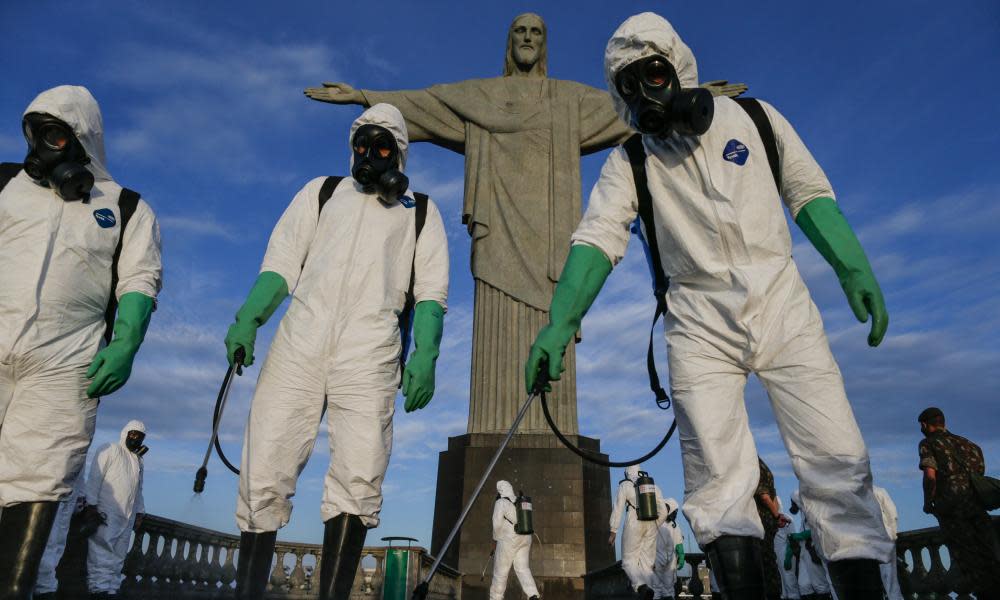Reporting from Latin America: 'Coronavirus has proved an intensely political story'

When I set off from Mexico City for Rio with my family in early March, for what was supposed to be a short holiday, Latin America had not recorded a single death from the coronavirus.
Security staff at Mexico’s Benito Juárez airport wore face masks. A blue and red banner warned China-bound travellers to wash their hands, cover their mouths and, ominously, avoid contact with “live or death animals”.
But Covid-19 still seemed a relatively distant threat that had upended the lives of friends in China but was unlikely to do the same to us. As we boarded our flight that morning we looked forward to seeing Brazilian family and showing our three-year-old son, Santiago, the sea.
Five months later Latin America has been shaken by a humanitarian disaster that will inflict years of uncertainty and hardship on a land already in a profound state of flux.
More than 200,000 people have died since Covid-19 gripped the region we flew over on our way from Mexico to Brazil, almost entirely oblivious to the coming storm.
As the epidemic intensified, our break in Brazil morphed into one of the most draining and disturbing experiences of our lives. Holed up in a small flat in Rio, where the governor had ordered residents to stay at home, we watched in horror as Brazil’s death toll rose from zero to nearly 100,000 in just a few months.
“Am-bu-lance! Am-bu-laaaance! Am-bu-laaaaance!” our son would scream excitedly each day as paramedics in full-protective gear sped past our balcony towards a nearby Covid-19 field hospital, sirens blaring.
Santi had no way of comprehending the largely hidden catastrophe playing out around us. But as the days and weeks passed, and I worked on my computer trying to fathom Covid’s impact on Brazil and its neighbours, the human toll became all too clear.
“The authorities are just leaving us to die,” Eduardo Javier Barrezueta Chávez, a 33-year-old resident of Guayaquil, Ecuador, told me over WhatsApp in early April from his living room, where he was sitting with his father’s decomposing remains.
Days later I spoke to Gilson de Freitas, whose mother had just been consigned to a mass grave in the Brazilian city of Manaus. “It’s madness, just madness,” he told me as the city’s health and funeral services collapsed. “What are our lives worth now? Nothing.”
Technology was a indispensable ally as I set about reporting Latin America’s coronavirus crisis while trapped under quarantine in Rio.
Using WhatsApp, Skype, Zoom and Twitter, I tracked down and interviewed bereaved Brazilian families, Mexican doctors and Venezuelan politicians - all from the relative comfort of my son’s cramped bedroom in our temporary home.
In mid-April I sat down at my laptop to speak to Brazil’s former president Luiz Inácio Lula da Silva, himself sheltering in São Paulo, who warned the country’s current leader, Jair Bolsonaro, was “leading citizens to the slaughterhouse” with his reckless Covid response.
Lula was right. On the day we spoke Brazil’s confirmed death toll stood at just 1,952. As I write these lines – four months later – it has swelled to more than 100,000, the second highest number in the world after the US. Back in Mexico the situation was also deteriorating, despite claims from its populist president that the virus had been “tamed”. More than 50,000 Mexicans have now died from Covid-19 – the third-worst toll.
From the start we knew giving those statistics names and faces had to be a priority.
We reported on the life and death of a Brazilian clown, Potato, who had entertained seriously ill children in one Rio hospital before dying there himself.
With Caio Barretto Briso, one of the many talented regional stringers contributing to our coverage, we remembered the nurses, samba musicians and favela residents being lost as the pandemic ravaged their country.
Other correspondents, from Puerto Ordaz, Buenos Aires and Asunción to Bogotá, Lima, Guadalajara and La Paz, paid witness to the suffering coronavirus has forced on the some of Latin America’s most vulnerable people, including Venezuelan refugees and prisoners, Mexican healthcare workers, Colombian shantytown dwellers, indigenous communities in Brazil and inhabitants of the remote Peruvian Amazon.
Coronavirus has proved an intensely political story, as well as a humanitarian one, and perhaps nowhere more so than Brazil. From day one Bolsonaro has played down the epidemic, sparking international outrage, domestic protest and even accusations that he was promoting a genocide.
“So what?” the far-right populist snapped as Brazil’s death toll began its inexorable rise. “I’m sorry. What do you want me to do?”
As a reporter, covering the political bedlam has been exhausting and perplexing – a ceaseless deluge of fake news and fury. As the father of a young Brazilian as well as British citizen, it has been profoundly dispiriting. What hope for Santi’s South American homeland when its top leader sees tens of thousands of citizens lose their lives and shrugs: “We’ll all die one day”?
A ray of light came in July, on one of our last nights in Rio before flights to Mexico resumed, when I fired up Skype for a Friday night chat with the legendary composer Caetano Veloso.
Caetano, whose music was among the first things that drew me to Brazil, was crestfallen too. He feared the toxic political atmosphere could bring “great violence” to his country. He feared losing his life to Covid-19 as the epidemic escalated further. He was appalled by Bolsonaro’s foolhardy, anti-scientific response. “I think it’s sick,” the 77-year-old musician said.
Yet despite this Caetano insisted he was “scandalously optimistic” about the future.
“Pessimism is too convenient,” he said. “Everything that’s happening in the world right now is telling us something.”
What it is telling us, none of us could say.

